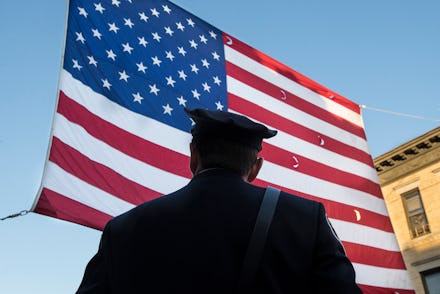New Poll Shows Surprising Consensus Among Democrats and Republicans on Police Reform

Recent measurements of American public opinion have painted a picture of a nation divided over the fairness of our criminal justice system along the lines of race and political ideology. Whites trust the police more than blacks; conservatives trust the police more than liberals. But a Washington Post poll reveals a rare moment of deep consensus across the political spectrum on two measures for reforming the police.
The survey, which was conducted after the recent non-indictment of police officers who caused the deaths of unarmed black men Michael Brown in Ferguson, Missouri, and Eric Garner in Staten Island, New York, shows that 86% of Americans support requiring that patrol officers in their communities wear video cameras while on duty, and 87% support having independent prosecutors handle oversee cases in which police kill unarmed citizens.
Even among Republicans who think the grand jury was right to decline to indict the police officer whose chokehold caused Garner's death this summer, 76% percent support independent prosecutors, according to the Washington Post.
These instances of cross-partisan agreement are noteworthy given the stark divides between liberals and conservative and whites and blacks on virtually everything else covered by the survey. For example, 80% of white Republicans consider Brown and Garner's death to be isolated incidents, while 60% of white Democrats believe they're part of a broader pattern. Blacks are twice as likely as whites to doubt the sufficiency of police training on restraining the use of force, and even more skeptical than whites on whether police are held accountable for misconduct.
All this is taking place against a backdrop in which recent police brutality incidents have corresponded with whites reporting increasing faith in the police to be color blind when it comes to protecting their local community.
So if the nation is so deeply at odds on the fairness of the police, then what explains the points of consensus on police reform? The answer lies in the fact that body cameras and independent prosecutors can't easily be filtered through the conventional language of political ideology. Body cameras haven't (yet) been racialized or associated with pro- or anti-authoritarian sentiment, and at face value they sound fair to respondents who have by and large never had to contemplate how to improve law enforcement practices.
A key factor to explaining these reforms' universal appeal is how they dovetail with a foundational American value that's been explored by a number of political scientists: equality of opportunity. As ardent believers in meritocracy, Americans don't believe in equal outcomes; on average they do think that, ideally, everyone should have a fair shot. (Consider the bipartisan popularity of improving educational performance as a means of mitigating poverty, as opposed to the European approach of expanding the provision of social services and aid.) While most people polled couldn't possibly have deep knowledge of the legal process for prosecuting misbehaving cops, body cameras sound like objective arbiters of justice, and it's hard to fault the idea of an independent advocate.
To give you an idea of why these findings shouldn't be over-interpreted, consider that when CBS polled the public earlier in December on independent prosecutors and gave people the option of a local district attorney, the consensus didn't emerge. The poll shows public opinion was split closely, with 49% preferring an independent prosecutor and 39% a local district attorney.
Wide-reaching reform will always be divisive, especially in a country as polarized as the United States. But at the moment there is a window of opportunity for some significant institutional adjustments to improve law enforcement if the measures don't stoke partisan fires.